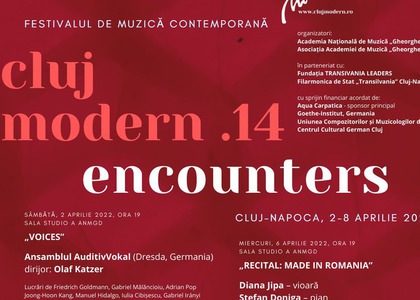> [Archived] Interviews

Interview with composer Adrian Pop, director of Modern Cluj Festival
The 14th edition of Modern Cluj Festival took place between 2nd and 8th of April, and it is the subject of our discussion.
Professor Adrian Pop, the 14thedition of Modern Cluj Festival has come to an end, the composers spoke of the two years of pandemic not only as a of period of restrictions, but also as a respite in which current activities left room for intense work, for reflection, for a new perspective upon life and art. How did all of these things mirror upon Modern Cluj Festival?
Modern Cluj Festival, which is a biennial festival in odd years, needed to take a break in the peak year of the pandemic. We couldn't succeed in our plan. Of course, we felt it like a great frustration, and we started the same project from scratch, a project which was considered for this year when we managed to put in on stage with a few sacrifices because not even this year is easy. We have recovered this duty to ourselves and to our audience. I am not aware if composers wrote too much, I don't know if this cloudy sky mirroring musical life stimulated creation, but it is certain that they have worked out issues of prosaic matteras I did myselfduring the pandemic years - different kinds of catch ups from our tumultuous life despite all the facilities we have. I think we take even more tasks maybe because of this. However, the revival of this festival was an awaited breath of fresh air, and it was the removal of a fear which managed to install itself.
From your organizer's perspective which were the Festival's most successful moments?
As an organizer, I have a parent's position. Every concert was projected, discussed, agreed on with the artists and it is very tough for me to organize them along hierarchical lines. I may say that every one of them was according to my expectations.
Now, if we want to differentiate the artists, a special mention goes to an ensemble of vocal soloists from Dresden, named Auditiv Vokal, which opened the concert with a programme made of songs written by German and Romanian composers. It was indeed a dialogue, a meeting. In fact, the whole edition was called ''Meetings''. So a meeting between German and Romanian creators on a band's territory; an incredibly ductile band which sings works of an immense difficulty, along with crystal clear works such as Schutz, who found place in this context among contemporaneity and baroque.
The Arcadia Quartet, which once again honored us with its presence, can never be anything but superlative. They had a particularly successful concert in which they somehow integrated their international project with Chandos House, to perform an integral part of the quartets of an unjustly underestimated composer - this is Mieczyslav Weinberg, who is in a great change, colleague of generation with Prokofiev and who lived and worked in the former Soviet Union. I was part of this reconsideration effort that Arcadia offered us and through which I caught the pulse of this new record star discovered by the West.
Then, the "Cluj a la carte" concert is a common generic in whichwegathercreations of Cluj composers, because we want to always be as wide of a platform as possible for the creation of our composers of all generations. It was a success and a highlight of the Couleurs Ensemble, led by Alexandru Murariu, and of the Impact XXI Ensemble, led by the composer Ionică Pop, who did not appear on the stage of our festival.
The AdHoc ensemble, which is a regular of Cluj Modernului and a successor of Maestro Țăranu's Ars Nova, currently conducted by me, presented a concert entitled "Incontri / Rencontres / Encuentros", again meetings, but only between Latin composers, as it was said before - French, Italian, Romanian, South American, Spanish - which here had a different ethnic and expressive color than the German-Romanian concert I was talking about. And this was a concert well appreciated by the public.
The last recital, given by the violinist Diana Jipa accompanied by Ștefan Doniga - artists from Bucharest, presented a program in which composers from Bucharest, Iași were, in turn, present and they represented for us a revelation... especially Diana Jipa, as a violinist, who also appeared as a soloist in the first absolute audition of the Violin Concerto "through the light of flowers" by Ulpiu Vlad, which took place in the closing concert held by the Philharmonic.
The Philharmonic deserves special thanks, because in the current extremely precarious conditions it has agreed to do this program for Modern Cluj, which is a traditional partner, from now on.
What are your plans regarding the next edition of Modern Cluj Festival and when will it take place?
We don't have any more plans. Modern Cluj is a biennialfestival and we want to keep it that way. We are aware that we skipped a year, but we are not decided to have a new edition next year in order to be back on the odd year's track. If this won't be possible because odds are still against us we will try again after two years.
As for what we would like to put on stage, I have a whole file of ideas and projects. There were things in this festival that we gave up for lack of more substantial funds and that we would definitely like to resume in a future edition. The plans are to continue in the same format for a week, a concert in the evening, which gives consistency. We found this format that suits us and we want to continue it, either next year or in two years, depending on what happens for us... In joy we will overcome everything, as the poet says.
Translated by Translated by Mara-Sabina Rolea
University of Bucharest, Faculty of Foreign Languages and Literatures, MTTLC, year I
Corrected by Silvia Petrescu














